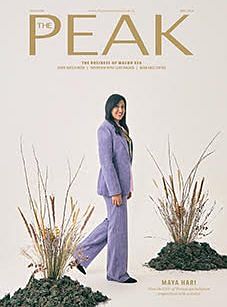[dropcap size=small]H[/dropcap]e enters the room in a smart cream blazer and jeans. His hair is tousled, but it’s as though every strand is where it should be. A polite smile and then a firm handshake. Darrell Ang exudes presence, and naturally so. He is, after all, a Grammy nominee.
And to think the Singaporean is only 36 years old. Ang has come a long way since hearing the first strains of classical music at the age of four. Twelve years later, he packed his bags for St Petersburg and Yale, where everything fell into place.

His virtuoso conducting has since garnered awards. His Zhou Long Chen Yi: Symphony “Humen 1839” with the New Zealand Orchestra was nominated for best performance at last year’s Grammys. But the highlight, so far, is a clean sweep of the three top awards – the Grand, Audience and Orchestra prizes – at the 50th Besancon International Young Conductor’s Competition in 2007.
Now based in France, Ang is every bit the Singaporean who went abroad to carve out his niche. Leaving the nation at a time when opportunities to fine-tune his passion here were limited, and being away for most of two decades, he could be forgiven if he has difficulty identifying with his homeland. But this isn’t the case.
“The older I get, the more Singaporean I become,” he tells The Peak. “When I was 16 and couldn’t wait to get out, I didn’t feel very Singaporean because there was very little support for me. I felt that I didn’t belong and I didn’t want to belong. But those were different times.”
And, according to Ang, times are certainly changing. While Russia and Yale groomed him, he believes aspiring Singapore classical musicians now have excellent avenues here. He cites the Yong Siew Toh Conservatory of Music and Nanyang Academy of Fine Arts as examples. And he is eager to help them follow in his footsteps.
This is why he is the artistic director of the Singapore International Festival of Music, which is into its second edition. This year’s edition was held from Oct 13 to 23. There’s a glint in his eye as he explains: “My aim in starting this festival really was to give a platform to young Singaporeans. We have a large community here who play at a high, international level and it is worthwhile to expose them to a wider audience.
“We used to have only the hardware but now we have the software – very good musicians, artists, actors, writers and playwrights. So what we really need is a game plan to get things rolling, and for people to step forward and take charge.”
Ang remembers fondly how St Petersburg’s classical music venues, from opera and ensemble to piano recital and orchestra, were filled every evening. He sees no reason why it cannot be the same in Singapore, which is a global financial hub.
“It’s going to take years, probably generations, for us to have such a vibrant scene. But we have to start somewhere, so why not start now?
“We have great musicians, but Singapore is not a world-class music hub yet. But, if top global players are brought here to perform and they see the talent here, word will spread around the world. This will make people talk about us.
“That’s what I want this festival to achieve.”









